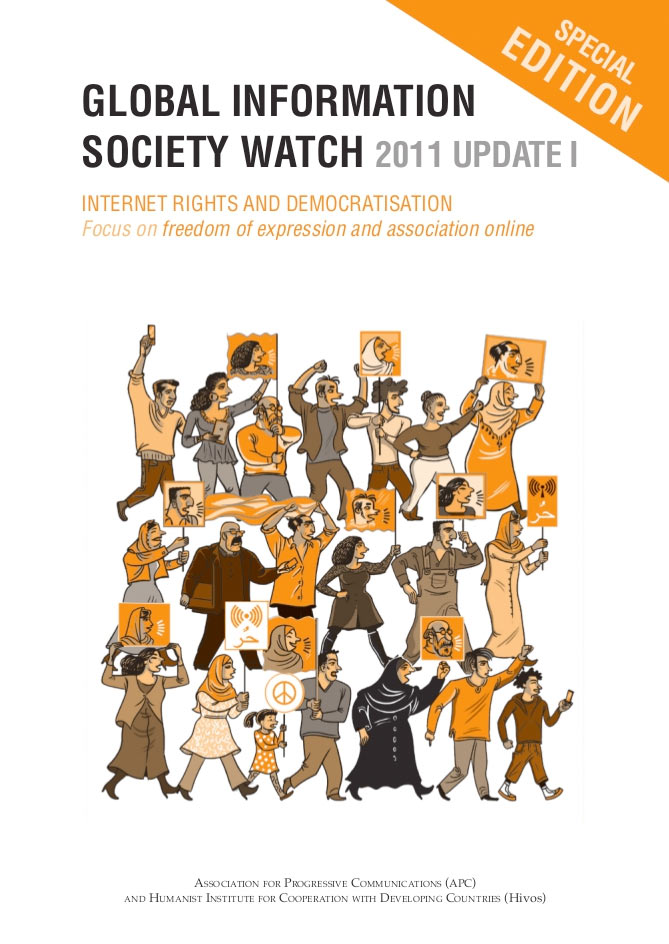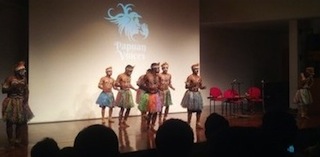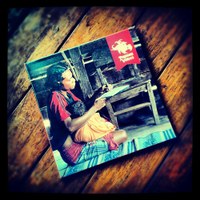EngageMedia Blog
Global Information Society publishes updates on internet rights in six countries
The 2011 edition of the Global Information Society Watch, titled "Internet Rights and Democratization: focus on freedom of expression and association online" has published the first in a series of updates on six country reports. This special edition contains updates from Argentina, Azerbaijan, Indonesia, Pakistan, Saudi Arabia and South Africa as well as an introduction from the Electronic Frontier Foundation's Jillian York.
The update on Indonesia, titled 'Monitoring and defending freedom of expression and association on the internet in Indonesia' is authored by Ferdiansyah Thajib for EngageMedia. Ferdi was interviewed here.
From the introduction to the volume by Jillian York of the Electronic Frontier Foundation:
 'In Indonesia, where Thajib writes that media has become a central indicator of freedom and openness post-Soeharto, the online sphere is often reflective of the country’s great diversity, harbouring a “broad spectrum of political differences, ideologies and behaviours”. But, as Thajib notes, it is “not uncommon” for online exchanges to result in hate speech, which is in turn arbitrated by the Ministry of Communication and Informatics (MCI).
'In Indonesia, where Thajib writes that media has become a central indicator of freedom and openness post-Soeharto, the online sphere is often reflective of the country’s great diversity, harbouring a “broad spectrum of political differences, ideologies and behaviours”. But, as Thajib notes, it is “not uncommon” for online exchanges to result in hate speech, which is in turn arbitrated by the Ministry of Communication and Informatics (MCI).
In some cases, “given enough political weight”, the ministry interferes by blocking or removing content. The MCI has taken greater steps to censor content as well, banning YouTube, MySpace and other sites in 2008 in an effort to block the Dutch film Fitna and, more recently, blocking 300 websites allegedly publishing “radical content” in an effort to “clean out” the web of immorality.'
The Papuan Serving of Culture, Video and Change
 As the Merauke dancers waltzed into the Goethe-Haus theatre, the people who turned up for the Bakar Batu Papuan Voices Launch knew they were in for an evening of West Papuan culture which was filled with more than just the usual sad stories, but more so with hope and inspiration.
As the Merauke dancers waltzed into the Goethe-Haus theatre, the people who turned up for the Bakar Batu Papuan Voices Launch knew they were in for an evening of West Papuan culture which was filled with more than just the usual sad stories, but more so with hope and inspiration.
Master of ceremony and Papuan Voices filmmaker Cyntia Warwe welcomed the audience, giving a bit of a philosophical explanation of the event.
“Bakar Batu (literally translates to earth oven in Indonesian) or ‘barapen’ is an event where Papuans gather for a special occasion,” said Cyntia. “And this is a special event indeed, we’ve cooked up nine videos proudly, and we want to serve them to you, our friends.”
The theatre was packed. The Sisir Bambu acoustic group followed the dancers. Lead singer Sem Awom sang his work and also Mambesak songs to celebrate the cultural struggle of Papua.
“Years ago, there was a guy named Arnold Ap who worked very hard to keep the Papuan culture alive through the group Mambesak,” Sem said. “Unfortunately, his great work was deemed separatist by the then regime, and in the end he was arrested and killed.”
The award-winning filmmaker Wenda Tokomonowir kicked off the film screening with the acclaimed “Surat Cinta Kepada Sang Prada’ (Love Letter to the Soldier). There were a total of 11 films screened. It was an emotional roller coaster as the films showed the tough lives many Papuans have to face, but encouraging as the same peoples are also not back down and fighting hard for survival. A video called ‘Salam Bilogai’ about a traditional Bilogai click handshake lit up the theatre with laughter as the audience demonstrated the handshakes with one another.
Papuan Voices co-producer, Wensi Fatubun, said that even though the project that ran since 2011 was a video initiative, both EngageMedia and Church group JPIC MSC have encouraged the participants in Jayapura and Merauke to design and use the videos for change.
“Papuan Voices is a cultural struggle,” said Wensi. “We want people to see Papua through the eyes of the Papuans themselves.”
“Winning accolades was not the intention, but we are grateful of that. But to change and inspire is a lot more important.”

The evening was also about the unveiling of the dedicated Papuan Voices website – www.papuanvoices.net. This particular site compiles the nine Papuan Voices videos, along with various background information about the places and issues raised in the videos, a study guide that teachers/educators can use to trigger discussions, a screening guide and a take action page that provides information on groups to join and resources to read more about West Papua.
At the end of the screening, the audience were led outside to eat the sago and betel nut made by the indigenous market traders in the video ‘Awin Meke’.

One audience said: “Thanks for letting me take a peek to the window of lives in West Papua for the first time. I hope folks in the TNI (the Indonesian Armed Forces) and the Government can have the opportunity to take a look at the videos also.”
More pictures from the launch here.
The Papuan Voices Compilation DVD can be purchased here.
Stories of Freedom and the Struggle to Keep It
I had the pleasure and opportunity to attend this year's Freedom Arts Festival (FAF2012) held in Jaya 1 in Petaling Jaya in Malaysia. It is the 10th year of the Pusat Komas' Freedom Film Fest. As such, this year, it was more than a film festival. The two-day event included workshops on utilising different art forms for activism, booths that showcased the work of different groups, and a graffiti board where everyone was invited to draw with local political cartoonists (mostly those whose comic books were banned).
But really, I came for the films. And the FAF2012 didn't disappoint. All of the films I saw during the festival told different angles of democracy, freedom and human rights, and the struggles to fight against those that seek to take those away from different sectors of society. The film festival was bracketed by two highly acclaimed documentary films.
The opening film, '5 Broken Cameras' by Emad Burnat and Guy Davidi, told of the non-violent resistance from the residents of a Palestinian village of Bil'in against the increasing occupation of the Israeli army. The story was told from the perspective of Emad Burnat, a farmer who bought his first camera to document the birth of his fourth son, and who ended up being the documentor and archivist of the struggle to keep their land safe from encroachment from the Israeli army. It documents how his cameras witnessed until each of them broke, the loss of their livelihood, the injustice their village suffered from the Israeli military, the solidarity they received from Israeli activists, and the clever efforts of the citizens of Bil'in to protect their land. As a documentor and witness, Emad Burnat captured not only the struggles that his village faced, but the heart, the hope and the humour of the local activists had as they went about fighting for their rights and protecting their lands.
Ending the festival was the closing film, 'Call Me Kuchu' by Malika Zouhali-Worral, and Katherine Fairfax. It documented the struggles of gay and lesbian rights activists in Uganda in a time when their government sought to pass a law that made homosexuality punishable by death. It told the tale of David Kato, the first openly gay man, and his friends, as they fought to defeat the legislation. There were moments of victory in the film: when they won against a tabloid that spied on gay and lesbian bars, took photos and published names of gays and lesbians; and when the international community made it known to the Ugandan government that the passing of such a discriminatory law was unacceptable. And there was despair: a lesbian telling the tale of her 'corrective rape'; the fear that being 'named and shamed' in a publication; and David Kato's murder. But there was also hope: the efforts of the gay and lesbian activists to find spaces where they can be themselves and safe; and the continuing struggle both in Uganda and internationally to stop the law against homosexuality from being passed in Uganda.
In the middle of these two films were the gems of the entire film festival, the winning documentaries of the 2012 Freedom Film Festival (FFF2012). Three Malaysian documentaries that sought to shed light on unknown moments in Malaysian histories and unheard perspectives on current events.
The first film, 'The Silent Riot' by Nadira Ilana, tells of a moment in the history of Sabah that not many know of and is hardly talked about. In 1985, the ruling political party in Sabah lost to the opposition. What happens next could give credence to any political conspiracy theory (and I mean that in a good way). The coalition between Parti Bersatu Sabah (PBS) and the United Sabah National Organisation (USNO) that toppled the ruling party, broke down when the head of USNO got into backdoor deals with the national government to take control of Sabah through violent threats. The overnight power struggle between the two opposition parties signaled a year of demonstrations that silenced the majority of Sabah.
The second film, 'M-C-M' by Boon Kia Meng, depicts a different picture of Malaysian economic growth and development from the perspective of young Malaysians and the issue of home-ownership. The film takes us through the story of how Malaysian capitalism has evolved in such a way that middle class young people in the country will not be ale to afford their own homes even as they grow older. The cleverly shot and edited film lends a cool, young, hip vibe to an explanation of modern capitalism in Malaysia.
The third film, 'The Rights of the Dead' by Tricia Yeoh, explores the death of Teoh Beng Hock, who died under the custody of the Malaysian Anti-Corruption Commission (MACC). Government-led investigation ruled his death as 'suicide', claiming that he jumped off the MACC building. Other evidence suggest otherwise. The filmmaker takes reveals the connections and politics between government agencies in Malaysia that should ensure justice for citizen but as ineffective in providing that, especially for those who die under custody. Interspersed in the story-telling are interviews with Beng Hock's family and fiance, who tell of how they found out about his death and how it has affected them. To me, the film was a heartfelt and honest 'wtf happened?' -- an exploration of what really happened to Beng Hock on the night of his interrogation, how much the government covered it up, and how it was not an isolated case.
At the end of each film, there was discussion about the issues covered. The audience was given a chance to share their thoughts, ask their questions and provide feedback on the films. And that was such a great thing to see: for the audience to try to connect the gay and lesbian rights activism in Uganda to the persecution of gays and lesbians in Malaysia; to get questions to clarify the Palestinian-Israeli issues; to discuss death in custody issues in Malaysia and so on and so forth.
I do hope there's an FFF2013, because if the quality of films that will be shown there is half as great as the ones shown in FFF2012, I'm definitely in.
 Subscribe to blog feed
Subscribe to blog feed